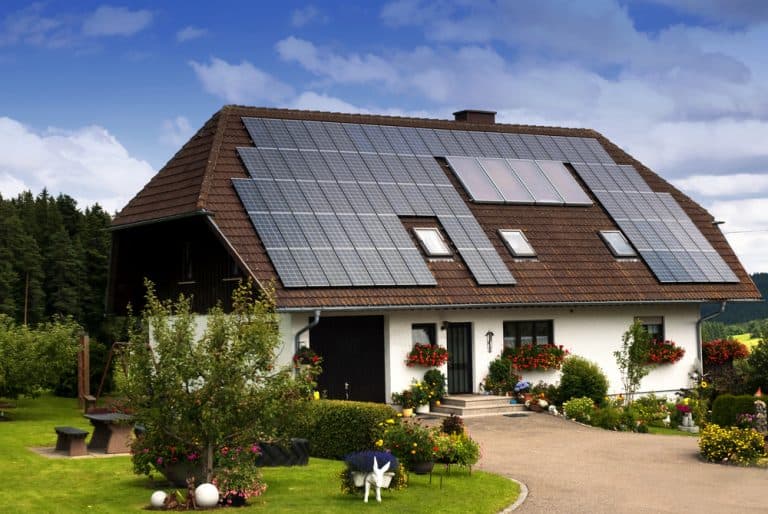Portable Solar Panels and Generators vs. in-Home Solar Options

The best way to charge your portable solar battery depends on how you want to use it.
A portable solar panel will charge Goal Zero’s Yeti 3000 in roughly a day or more. One reason they do not last very long and they take a long time to charge is because they are engineered for for emergency backup.
In an emergency, you won’t have time to wait for your portable generator to charge. If you want to power during an outage, you should look for a a better solar-powered charging solution, and this typically comes in the form of a solar battery powered by home solar panels, not portable ones.
Reno Nevada Portable Solar Panels
Portable solar panels usually produce about 100 watts and can be set up wherever the sun is shining, and Reno gets lots of sunshine. They make charging devices and portable generators possible anywhere. These solar panels, however, are not as quick or enduring of a power supply.
Why Portable Solar Panels Produce Less
Every solar panel has a certain wattage rating. Wattage is a measurement of the amount of electricity produced or used.
You can determine wattage by multiplying amperage by voltage. A typical residential solar panel will produce between 250 and 365 watts, making it more efficient.
Since portable solar panels need to be easy to move, they are made at a much smaller size. The problem is that when you use smaller portable solar panels, you don’t get the same amount of power, and also sacrifice panel efficiency for durability.
Portable Solar Panels and Panel Type
One factor that plays a large role in the wattage of the panel is the type of conductive material used. Often because portable solar panels need to be lightweight, they are made with thin-film. However, there are some mono-crystalline and poly-crystalline portable panels.
Each panel type has different efficiency ratings. Monocrystalline and Polycrystalline panels have the highest efficiency ratings on the market. Because portable panels have lower photovoltaic efficiency, they are not ideal for a wide range of situations.
The Best use for Reno, NV Portable Solar Panels
Portable solar panels have their specific niche within the solar industry and the greater Reno, Nevada area as a whole. Let’s take a look to see if you fit the mold.
Handheld Solar Panels
One of the most common forms of the portable solar panel is a handheld solar panel, frequently used for backpacking in Nevada. These solar panels are small enough that they can be attached to your backpack or held in the palm of your hand.
If you have a phone that you want to ensure is charged during your adventure, handheld solar is perfect. However, if you need to power anything bigger or a large variety of chargeable devices over the span of a longer outing, these devices won’t do you much good.
Boon-docking and Power hookups
Another great use for portable panels is boondocking. Boon-docking, otherwise known as dry camping, is a motor home lifestyle.
Boon dockers camp in remote places for several weeks, then drive to their next camping spot. Often these places don’t have any power hookups.
However, portable solar panels hold a valuable purpose. Portable solar panels are the perfect solution for people living the vagabond or road warrior lifestyle. Just like the rest of the items packed up into the average Nevadan’s motor home/RV, they are not fancy, but they can “get the job done,” providing Nevadans enough wattage to power their essential devices.
It helps to balance the need for technology with the choice to live in nature. Most people, however, don’t live this way. Their energy needs are far more complex than a couple of appliances in a camper.
Portable Solar and Batteries in Reno
Solar panels can also be used if you are using a portable solar battery on a week-long camp out. These solar panels allow you to charge your battery while you enjoy the sun. When you come back you have electricity to charge everything including your phone, GPS tablet, and rechargeable headlamp.
The problem is that all these activities are low-energy consumption activities. For instance, many Reno natives need to power their homes in an outage when power supply is interrupted, and a portable solar panel isn’t going to do a homeowner much good in this scenario.
Why Residential Solar with Battery and Backup Options is Better than Portable Solar for Most Reno Citizens
A residential solar array paired with some form of solar backup is going to be your best option for home power, even if you live a cavalier, on-the-road and frequently traveling lifestyle. Powering your home with solar has far more uses than functioning as an emergency power source—it is a way of life.
How Reno Natives Can Safeguard themselves Against Net Metering Rate Reductions with Home Solar Plus Portable Backup
Those who choose to purchase home solar drastically reduce their electric bill with power from the sun. This is not only a battery source of power, but also a cheap and dependable one.
Homeowners in Nevada with solar who have installed solar with battery backup have found they save thousands more dollars. This is mainly due to how battery backup plus home solar prevents the homeowner from losing money on the dollar at a below-market-rate-value to the utility companies in the area.
Net metering is a policy that credits electricity customers for their excess solar generation. This helps offset the cost of power drawn from the grid at night.
In Nevada and in Reno in particular, solar customers are able to lock themselves into a net metering rate for the next 20 years. This means that they don’t have to worry about electric rate fluctuation.
Don’t limit yourself with portable solar panels. Use solar to its full potential with a residential solar array and home battery backup options.



Send a Message
Oops! We could not locate your form.